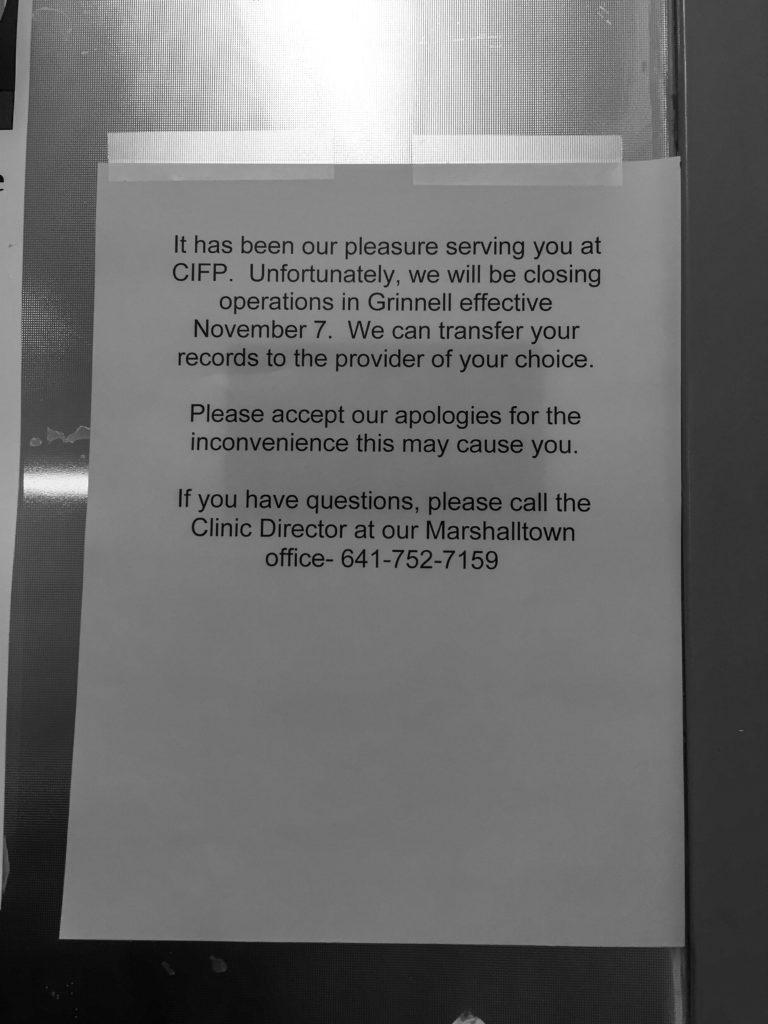By Mira Braneck
braneckm@grinnell.edu
Central Iowa Family Planning (CIFP), a reproductive health care clinic that provided low cost or free access to care in Grinnell, closed its doors on Monday, Nov. 7. The decision was made very rapidly and came as a shock to the community, the College and even the individuals that worked at CIFP. However, in response to this decision, the College met with the healthcare community of the City of Grinnell on Thursday, Nov. 10. At the meeting, the decision was made to begin the process of opening a new, similar clinic in Grinnell, with the College backing the clinic financially until federal funding is obtained.

What services did CIFP provide?
CIFP provided “comprehensive, low-cost reproductive health care and family planning services,” according to the clinic’s website. Although founded as a stand-alone clinic, the clinic eventually obtained Title X funding, funds that are designated to provide low-income or uninsured individuals access to family planning and reproductive services.
“For most of our patients, it’s free care, which means they get free birth control as well as STD testing and reproductive health counseling,” said Claudia Beckwith ’77, a nurse practitioner who has been working at CIFP since 1989. “So it’s been an amazing government program, and it still exists, but the clinics that have Title X funding that can stay open now are those who also have some other major funding.”
The clinic, which Beckwith describes as having provided “LBGT friendly and feminist care,” provided birth control, pregnancy testing, breast and pelvic exams, STI and HIV testing and family planning education and counseling, all at a very low cost or completely free to its patients. Many of the patients went to the clinic either out of financial necessity or in search of confidential access to reproductive care.
Beckwith saw something special in the way the Grinnell office of CIFP operated.
“I would say that since we’re the satellite clinic, the clinic had its own personality. We could practice how we wanted, as long as it was safe and careful,” she said. “We were able to put our personality into it, which was really nice.”
What brought on the closure?
The decision to close CIFP came very suddenly and shook the community. The board of the organization making the decision to close on Tuesday, Nov. 2, informed the staff on Wednesday, Nov. 3 and closed its office on the following Monday.
The clinic simply did not have the funds to continue its day-to-day operations. Last April, the state privatized Medicaid, which is now run by three managed care organizations (MCOs), which essentially ceased payments to CIFP.
“They’ve been paying us either not at all or a lot less or delaying the payment,” Beckwith said. “And so since April, our income has gone way, way down, because we haven’t been getting this major source of our income. That was what really precipitated the closing.”
The privatization complicated the payment process for CIFP. Deb Tharp, president of CIFP’s board, said that they were getting about 10 cents on the dollar, if they were reimbursed at all.
“Now when we have to request payment through these three agencies, they took a long time to get up to speed. They switched over at the beginning part of this year, and they didn’t know how to do what they were supposed to do, so they denied a lot of claims, they made it extremely difficult for us to get paid, and we just don’t have that kind of money to float and keep running when we don’t get paid for the services we provide,” Tharp said. “So we would submit a claim, let’s say for a dollar, and we would get 10 cents, and then we would have to resubmit the claim again, and we might get a little bit more. But it took a lot of energy and a lot of time on the part of our employees to try to get those reimbursements.”
Before the privatization, the clinic generally received funding on time and nearly in full.
“Our Medicaid in Iowa used to be fantastic,” said Angela Voos, chief of staff. “They paid well and they paid on time, which was unusual.”
A large part of CIFP’s cash flow came from Medicaid. “Maybe half of our income [came from Medicaid] and a really important source of funding for our patients who wanted confidential and free services,” Beckwith said.
This is especially difficult for nonprofits like CIFP, as they tend to have more restricted access to funds and rely on grants or federal funding. “With a nonprofit like that … it just drives them into the ground. They can’t buy supplies, they can’t pay their people when they get upside down. It just seemed like a snowballing thing,” Voos said.
CIFP received its Title X funds from the Family Planning Council of Iowa, a nonprofit organization that receives grants from the federal government to provide Title X family planning services in Iowa.
“Rather than us running our own clinics all over the state, in all of the areas we’re responsible for, we subcontract or contract with providers, organizations that can provide the family planning services,” said Jodi Tomlonovic, the executive director of the Council. According to Tomlonovic, about 15 to 20 percent of CIFP’s funding came from Title X funds.
Tomlonovic was surprised at how rapidly CIFP shut its doors.
“We knew they were having difficulties, and we had been trying to work with them and the MCOs to get the payments, but when the decision was made to close, we thought there would be a little more time before they closed. So that part came as a surprise to us,” she said. “We had anticipated a little more time to try to work out options.”
The mandating of converting health records to an electronic format also precipitated the closing. A lack of funds as well as minimal assistance in terms of technological services made it difficult for the clinic to convert to electronic health records.
“[Electronic health records are] extremely expensive for us,” Tharp said. “Again, it’s something that small clinics have difficulty dealing with, because we are low priority on the maintenance of that software. So when we call and we need help or just need updates or anything like that, we’re kind of on the bottom of the list. And so it’s hard for us to maintain that system, first of all because of the expense, but also because the support is very poor.”
What does this mean for the community?
“It’s just amazingly unfortunate,” Voos said, who described CIFP’s closing as a “community crisis.” As soon as she heard the CIFP was closing its doors, she reached out immediately to CIFP to offer the College’s financial support. “We reached out immediately to the Iowa Family Planning people and said help us understand why so urgently, why so immediately,” she said. “And their reasons were it was just that they hit financial difficulties that they could not surmount. So next I called Laura Ferguson who’s a Board [of Trustees] member and also a local doctor. We talked about how might we gap this. So we need a short term plan, because this is urgent, and then we need a long term plan.”
Laura Ferguson ’90, a self-employed family physician who sits both on the Board of Trustees and the Board of Grinnell Regional Medical Center (GRMC), was concerned and saddened by the closing of the clinic.
“All of our medical community understands the huge role Central Iowa Family Planning plays in the care of our patients, and we have long appreciated and supported that,” she said. “Our medical community very, very strongly supports Central Iowa Family Planning and unfortunately we weren’t aware that the closure was coming, … and we are all very saddened by the services that we lost for all of our patients.”
What is the College doing?
On Thursday, Nov. 10, the College, represented by Voos and Deb Shill, director of SHACS, held a meeting where members of CIFP’s board, along with Beckwith, met with representatives from GRMC. At the meeting, a two-part plan was formed. In the short-term part of the plan, there will be a nurse practitioner providing reproductive and family planning care for the community. Ultimately, the medical community, along with the College, plans to open a fully-operating Title X clinic with free services to fill the hole that CIFP has left.
“We have two plans. We have the short-term plan, which hopefully will involve Claudia Beckwith. She’s been providing these services in this community and other communities for some time, and we hope to work with her to reopen a clinic, either at the current location or possibly a location at the hospital campus, the problem is we won’t have those Title X funds. So we can have a practitioner there, that we can pay, it’s just the cheap meds, that’s the piece that we can’t have. And so in the meant time … as far as birth control pills, Walmart and HyVee both have month-supply of birth control pills for 9 dollars. … I’m hopeful that for most patients, for a short period of time, that would be a doable thing,” Ferguson said. “But we won’t have is the reduced cost Nexplanons and IUDs that we can get under the Title X funding that we’ll be applying for, so in the short term we won’t have that. But then we will also investigate reopening the clinic I expect with Title X funding, because of the cheap drugs. That’s a huge piece.”
Tomlonovic was also involved in the meeting, as the medical community and the College seek to eventually obtain Title X funds. “We’re in contact with Jodi [Tomlonovic], the executive director. She spoke with us about what it would mean to get the Title X clinic reopened in Grinnell. There remain a lot of questions about logistics and how much it’s going to cost. I absolutely believe those questions can be answered, and they will be answered,” Ferguson said. “And so today, basically the hospital administration will begin to investigate financing space, personnel, all those people that we’ll need to reopen the clinic.”
The College will be supplying the necessary funds for these projects, according to Voos. “We can both give seed funding and some gap funding as they get up and running,” she said. “So our participation will be a financial participation. And you know, energy, people, thoughts, getting people together — that other part of organizing, not just financial”
Ferguson was hopeful and optimistic after the meeting. “This was our very first meeting. … I was just so excited about this meeting, because we had all the shareholders. We had our practitioners, we had the state, we had the College, we had our public health person, we had our CEO, we had our grant writer,” Ferguson said. “Everybody is very interested in making this happen as soon as possible and we understand exactly how important this is.”
Kington expressed the fact that the College will continue to take part in the planning process and that it will be part of the next step. “The college has been aware of financial difficulties recently experienced by Central Iowa Family Planning, and had been working with the organization to better understand the needs and possible ways that we could help to be part of a solution,” he wrote in an email to The S&B. “In that context, we were surprised and saddened to hear of the abrupt closure. We continue to value the educational and healthcare services that they’ve provided and are working with our local medical community to examine alternatives for moving forward.”
Where can you get those services in the meantime?
The services provided by CIFP are largely available in the community, either through family practitioners or services provided by the College.
In the Midwest, family practitioners have training in obstetric and gynecological care. “In family practice in the Midwest, people are trained in OBGYN. It’s a very different system than on the coasts, where because of the populations and the supply of specialists, people tend to go straight to specialists,” Voos said. “In the Midwest, specialists are used differently and family practices are trained, … so for regular OB or GYN care, any of our general practitioners can provide that care.”
SHACS can provide a good deal of care as well, from STI testing to free pregnancy testing to safe sex supplies. “There shouldn’t be a gap [in care],” Shill said. “What we want students to do is just come to SHACS, make an appointment with a nurse who will assess your needs and then determine, can we meet those needs within our local community, is this something we have to refer outside of our community and then if funding is an issue, they can report that to the nurses, and we’ll have a conversation about how we can support that student.”
However, there is still the problem of confidentiality and free resources. “All of the care that was given at Central Iowa Family Planning is available in the community,” Ferguson said. “It’s just we’re private practice doctors and we don’t have that confidentiality clause, and we don’t have the cheap IUDs and the cheap Nexplanons that were so vital to our community that Central Iowa Family Planning could provide.”
For resources that are not available, the College is discussing providing a shuttle to Planned Parenthood locations in Iowa City or Des Moines.
“We have SHACS, we can create a shuttle if we need a shuttle for people to go to Des Moines if that’s the most comfortable thing, we can do that. We’re able to move agilely,” Voos said. “My greater concern is for the students and families of the schools here and the people who have been using the services.”
SGA is focusing on reaching out to students and keeping them informed on the different changes ahead. Anita Dewitt ’17, SGA president, has been in contact with President Raynard Kington, Shill and Voos, “just so we can do all the outreach we can about what they are doing going forward.”
Dewitt sees the College as truly caring about this as a community issue, affecting both students and community members alike. “I think they really care about this. They just weren’t able to do anything.”
What are the implications in light of the election?
The closing of a federally funded reproductive health clinic is a “community crisis,” as Voos puts it. But in light of the recent election, it takes on a much, much darker connotation.
“I think the environment to support this is much more unfavorable now than it was before,” said Professor Barbara Trish, Political Science. “It’s always been an uphill battle though.”
Trish understands the concern, but pointed out that the right has been pushing to restrict access to abortion and birth control for some time.
“Everyone’s eyes are on the US Supreme Court and any vacancies which will … be filled by individuals … that might vote to overturn Roe v. Wade if … cases come before them,” she said. “I don’t know if there’s going to be a wholesale change at the state levels. We have had strengthening of control by the right of the state apparatus, but certainly the right has had the upper hand for some time now. So I don’t know if you can expect a lot of changes, but I mean certainly that doesn’t mean people aren’t concerned that there might be changes.”
Under the Affordable Care Act, birth control was free. However, with the implementation of the new administration, this likely will change. “I think that everyone should be paying attention to whatever happens to replace or revise the Affordable Care Act, because that’s going to put on the table other issues of reproductive health,” Trish said. “In all likelihood, [free birth control] will not be part of a revised plan. That’s a concern for many people in college.”
Trish pointed out that the void of resources left in the wake of CIFP’s closing is not uncommon in rural areas. However, she thinks that resources will remain accessible in urban areas.
“Rural America is different than urban America with respect to access to services. I think that [accessibility] will be an increasing concern in rural America and perhaps it will feel the effects more than other geographic areas, and not just in this regard, but in terms of other services as well,” she said. “I mean, in some ways, the election outcome, to the extent that generally speaking Republicans are reluctant to turn to government for services, as rural America does have to rely a lot on the services offered by government programs. And so generally speaking, rural America might be in for a tough go of it. … But I’m not as confident that it will extend into other urban areas or other more densely populated areas”



























































